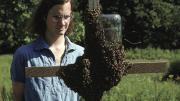The morescientists study the social insects, they more they are amazed. Thomas D. Seeley, Ph.D. ’78, professor and chair of neurobiology and behavior at Cornell, combines vocation and avocation, most recently in his delightful new book, Honeybee Democracy (Princeton, $29.95). He has the confidence and good humor to include a photograph of himself in 1974, longer of hair and more casual of dress, studying a swarm of his favorite species. The author note on the book jacket advises that he is “a passionate beekeeper.” His writing, beginning with this excerpt from the prologue, does his subjects honor.
Beekeepers have long observed, and lamented, the tendency of their hives to swarm in the late spring and early summer. When this happens, the majority of a colony’s members—a crowd of some ten thousand worker bees—flies off with the old queen to produce a daughter colony, while the rest stays at home and rears a new queen to perpetuate the parental colony. The migrating bees settle on a tree branch in a beardlike cluster and then hang there together for several hours or a few days. During this time, these homeless insects will do something truly amazing; they will hold a democratic debate to choose their new home.
This book is about how honeybees conduct this democratic decision-making process. We will examine the way that several hundred of a swarm’s oldest bees spring into action as nest-site scouts and begin exploring the countryside for dark crevices. We will see how these house hunters evaluate the potential dwelling places they find; advertise their discoveries to their fellow scouts with lively dances; debate vigorously to choose the best nest site, then rouse the entire swarm to take off; and finally pilot the cloud of airborne bees to its home. This is typically a hollow tree several miles away.
My motive for writing this book about democracy in honeybee swarms is twofold. First, I want to present to biologists and social scientists a coherent summary of the research on this topic that has been conducted over the last 60 years…. The story of how honeybees make a democratic decision based on a face-to-face, consensus-seeking assembly is certainly important to behavioral biologists interested in how social animals make group decisions. I hope it will also prove important to neuroscientists studying the neural basis of decision making, for there are intriguing similarities between honeybee swarms and primate brains in the ways that they process information to make decisions.… One important lesson that we can glean from the bees…is that even in a group composed of friendly individuals with common interests, conflict can be a useful element in a decision-making process. That is, it often pays a group to argue things carefully through to find the best solution to a tough problem.
My second motive for writing this book is to share with beekeepers and general readers the pleasures I have experienced in investigating swarms of honeybees. I can thank these beautiful little creatures for many hours of the purest joy of discovery, interspersed among (to be sure) days and weeks of fruitless and sometimes discouraging work. To give a sense of the excitement and challenge of studying the bees, I will report numerous personal events, speculations, and thoughts about conducting scientific studies.









